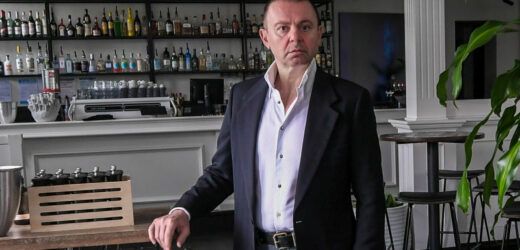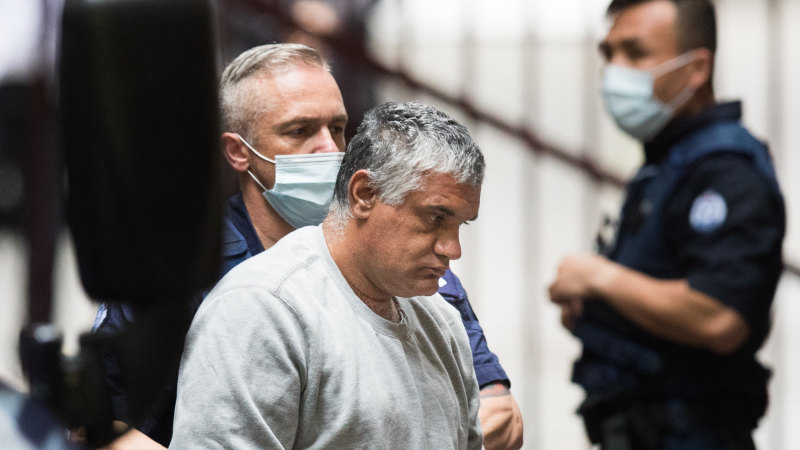Save articles for later
Add articles to your saved list and come back to them any time.
Don’t be fooled. Just because the restaurant you are dining in is busy, it does not mean business is booming.
There is an “unusual dynamic” in the hospitality industry at the moment, according to CreditorWatch chief economist Anneke Thompson.
Restaurateur and entrenprenuer Mario Di Nardo at The European Hotel in St Kilda. Credit: Justin McManus
“They are trading very well, but the cost side is getting them,” Thompson said.
“Being really busy is not necessarily a plus – the more customers you have, the more your costs are.”
“How much can you charge for a steak before you turn customers away?”
When restaurateur Mario Di Nardo established The European Hotel on the site of an “iconic and historic 1854 Melbourne landmark” in 2019, he sank $6 million into the development. The press release heralded as the “reimagining of a St Kilda icon”, thanks to the award-winning interior designer director Alex Zabotto-Bentley of AZBcreative.
Located on the corner of Fitzroy and Princes streets in St Kilda, the venue – which included casual eatery Rafaels, modern Italian dining at Crudino and cocktails and canapés at the Melbourne Lounge – was meant to open in February 2020. After three failed attempts, it eventually opened in November 2021.
But now Di Nardo has shut the multipurpose site, saying running costs are too high.
Reopening the space, which is available for private hire, would cost about $500,000 to train the 25 to 30 staff required, market the hotel and cover the running costs for the first two months.
“I’m saddened because I, personally, cannot keep funding the venue,” Di Nardo said.
“I would love to continue but I can’t continue. I don’t have the energy or the capacity financially to continue at all.”
Di Nardo is selling his business as a going concern and is calling for expressions of interest, via two real estate agents, for his long-term lease. He acknowledged that some restaurants operators were doing it tough but said many were not.
“We are wanting to sell it to a great operator who’s got the capacity to take on a large venue that has a vision,” he said. “It’s a great opportunity for them because all the work’s done. The fitout is impeccable.”
Last month, 140 food and accommodation businesses were made insolvent nationally, second only to the 243 construction businesses put into insolvency, defined by the Australian Securities and Investments Commission as the first time a business enters external administration.
The tough times in food business eclipsed 68 in retail, 62 in other, 41 in manufacturing and 30 in transport. There were 334 insolvencies registered in New South Wales and 237 in Victoria.
Thompson said she was aware of several restaurants which had opted not to open to full capacity, and would turn away customers so that they didn’t have to hire extra staff and impose another cost on their business.
“You look around and it’s really busy but you see the stress on the faces of the restaurateurs.
“The same number of people are coming though their restaurants as pre-COVID, but their bills are much higher.
“It is similar to construction but it is not as clear-cut,” Thompson said.
While restaurants don’t necessarily have the fixed price contracts that caused so much pain in the construction industry, they have had to pay more for rents, gas and electricity, and for produce. Some commercial rents were also tied to CPI increases.
Marco Di Nardo says it would take him $500,000 to restart his business. Credit: Justin McManus
Across all sectors, there were 828 insolvencies in March, surging from 359 in January and 692 in February, ASIC reported. In March last year, there were 464.
Thompson said she wanted to remind the public that inflation, while falling, was still high. “People forget that part.”
Some of the most high-profile recent business failures include construction companies Porter Davis and Mahercorp . They were recently joined by fine-dining meal-delivery service Providoor, founded by chef Shane Delia.
Restaurateur Shane Delia launched Providoor during pandemic lockdowns.Credit: Arsineh Houspian
Food and beverage had the highest insolvency rate at 0.97 per cent, ahead of construction at 0.7 per cent, CreditorWatch figures show.
Di Nardo has not put his business into insolvency and wants to sell the long-term lease. He said the ups and downs of COVID were behind what he called a “backwash and an aftermath”.
“There are still staff shortages. There are skill set shortages. There are increasing costs and labour, higher interest rates and things like that are going to affect a lot of people’s plans.
“COVID turn us into short vision people, whereas pre-COVID we had long visions.
“We had a financial plan for long term, but now we have to look month to month on how we’re going to even operate.”
The Morning Edition newsletter is our guide to the day’s most important and interesting stories, analysis and insights. Sign up here.
Most Viewed in National
From our partners
Source: Read Full Article





